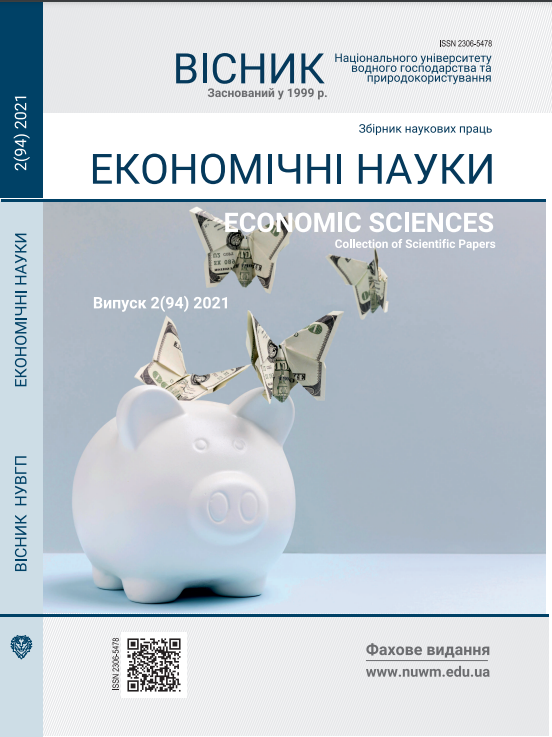ECONOMIC SECURITY AND TRANSPARENCY OF ENTERPRISES IN THE CONDITIONS OF DIGITALIZATION
DOI:
https://doi.org/10.31713/ve2202110Keywords:
economic security, digitization, threats, enterprise, transparency.Abstract
The article is devoted to the economic security in the context of digitalization. Peculiarities of ensuring economic security including taking into account the transparency of enterprises in modern conditions of digital technologies development are described in this article. Digitalization as a factor of positive changes in the reputation of organizations, their financial component, increasing the level of competitiveness and innovation of business, and accordingly strengthening the market position are determined. In addition, it is stated that threats to the digital sector maydisrupt the availability, integrity or confidentiality of the informationsystems on which economic activities are based. Accordingly, in this study,technology is determined, on the one hand, as a factor of development and a means of protection, and on the other as a source of threats. Digital threats to economic security are systematized and basic ones for the business sector are identified. It is proposed to group digital threatsto economic security into five basic blocks: systemic, structural, sectoral,business and personal. Along with this, a taxonomy of enterprisetransparency and a concept of enterprise activity are determined, whichtakes into account the limits of transparency, which would neutralize threatsto their economic security.Recommendations to increase the level of transparency of domesticenterprises on the basis of digitalization and taking into account threats toeconomic security are given based on the results of the analysis of theenterprise transparency index. It is noted that the cooperation ofgovernment, business, science and NGOs in shaping the institutionalenvironment of digital security and transparency of enterprises plays a keyrole in maintaining the conditions for economic security at various levels.Given the need to increase transparency, domestic companies need toplace information on business organization, innovation and corporate socialresponsibility on the relevant pages of corporate sites, and not just inreports, given the growing interest from investors, governments, expertsand other stakeholders. It is necessary to take into account the limits oftransparency, in order to minimize threats to the economic security ofenterprises.References
Zingales L. Towards a Political Theory of the Firm. Journal of Economic Perspectives. 2017. Vol. 31. No. 3. P. 113–130.
Demchenko I., Iatsukh O. The Problem of Unprofitable Activity of Enterprises in Ukraine. Baltic Journal of Economic Studies. 2018. Vol. 4. No. 2. P. 64–69.
Improvement of Public Financial Control in the Context of Ensuring Financial Security of the State / Meiss K.-M., Naumik-Gladka K., Krivtsiva T., Liadova Y. Economic Annals – XXI. 2017. Vol. 168. No. 11–12. P. 63–68.
Kubaichenko A. Classification of Forms of Shadow Economic Activity from the Viewpoint of Ensuring Economic Security. Baltic Journal of Economic Studies. 2018. Vol. 4. No. 1. P. 242–247.
Соломіна Г. В. Забезпечення фінансово-економічної безпеки підприємництва : навч. посіб. Дніпро: Дніпропетровський державний університет внутрішніх справ. 2018. 234 с.
Scott J. Measuring dimensions of perceived e-business risks. Information Systems and e-Business Management. 2004. Vol. 2. Iss. 1. P. 31–55.
Сталінська О. В. Система економічної безпеки підприємства в умовах розвитку цифрової економіки. Науковий вісник Міжнародного гуманітарного університету. Сер. Економіка і менеджмент. 2019. Вип. 38. С. 80–86.
Офіційний сайт PwC Україна. URL: https://www.pwc.com/ua/uk.html (дата звернення: 01.06.2021).
Нехай В. А. Інформаційна безпека як складова економічної безпеки підприємств. Науковий вісник Міжнародного гуманітарного університету. Сер. Економіка і менеджмент. 2017. Вип. 24(2). С. 137–140.
Халіна В. Ю., Сироватський О. А. Транспарентність діяльності будівельного підприємства як детермінант довіри стейкхолдерів. Економічний простір. 2020. № 156. С. 166–170.
Krasnokutska N., Kruhlova O., Kozub V., Martiskova P. Transparency of the enterprise: from theory to practice of evaluation (on the example of retail networks). Economic Annals-XXI. 2019.
Vol. 175(1–2). Р. 58–62. URL: http://soskin.info/userfiles/file/Economic-Annalspdf/DOI/ea-V175-10.pdf (дата звернення: 20.05.2021).
Хубієв Р. К. Транспаретність як фактор конкурентоспроможності. URL: https://www.econ.msu.ru/cmt2/lib/a/1530/file/Hubiev.pdf (дата звернення: 17.05.2021).
Boone A. L., White J. T. The effect of institutional ownership on firm transparency and information production. Journal of Financial Economics. 2015. № 117(3). Р. 508–533.
Білоцька І. А. Транспарентність корпоративного сектору як передумова результативності бізнесу в Україні. Інвестиції: практика та досвід. 2020. № 5–6. С. 56–58. URL:
http://www.investplan.com.ua/pdf/5-6_2020/10.pdf. (дата звернення: 07.05.2021).
Індекс прозорості компаній України 2019. URL: https://cgpa.com.ua/wpcontent/uploads/2020/10/Transp_index_2019_ua_full_web.pdf (дата звернення: 30.05.2021).

